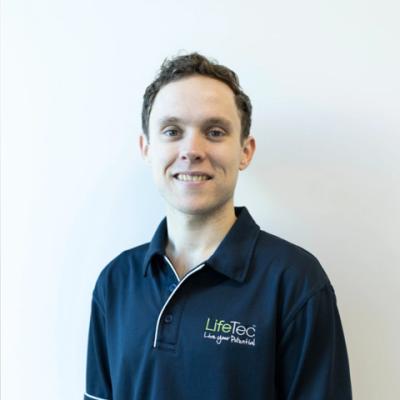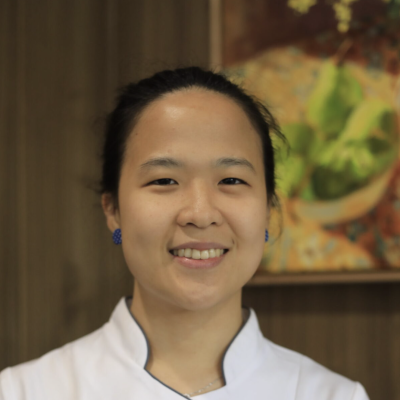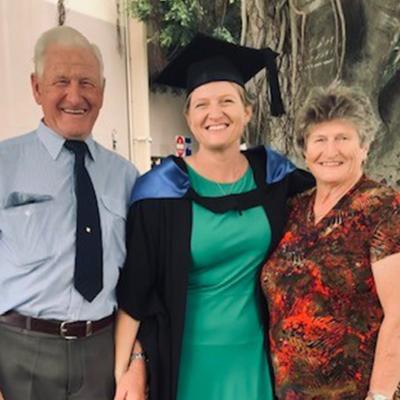The healthcare industry is booming, and if you’re looking to make a real impact, now’s the perfect time to jump in.
Skilled professionals are in high demand, and the opportunities are endless—whether you’re just starting out or ready to specialise. UQ has the programs to get you into those in-demand healthcare jobs and kickstart a career that truly matters.
Ready to take the next step? Let’s get you on the path to making a difference!
Why now? The World Health Organisation predicts that by 2030, there will be a global shortage of 10 million healthcare professionals. And in Australia, the healthcare and social assistance industry is expected to see the largest job growth of any sector, with 585,000 new roles projected over the next decade. This means you’ll have great job security and opportunities for career growth.
Where are healthcare professionals most needed?
Healthcare professionals are needed everywhere, but the demand is especially high in regional, rural, and remote areas. Many healthcare workers are drawn to big cities, leaving smaller communities with limited access to essential services.
But those who choose to work in these areas often experience unique rewards. Many appreciate the diverse work opportunities, the chance to serve a variety of populations, and the ability to develop closer relationships with patients. They also value the strong sense of community, the laid-back lifestyle, and the opportunity to make a meaningful impact where it's most needed. Plus, there are often career incentives and support programs to help with moving and growing your career, making the move even more worthwhile!
At UQ, we are deeply committed to enhancing rural and regional healthcare education. We offer rural health placements that provide students with hands-on experience in these communities, as well as scholarships to support students from regional and rural backgrounds. Additionally, you can pursue our Doctor of Medicine (MD) through one of our Rural Clinical Schools.
These initiatives not only offer valuable experience but also pave the way for a meaningful and impactful career in healthcare.
So, let’s take a closer look at some of the in-demand healthcare jobs across Australia.
Health careers in demand
- General practitioner
- Midwife
- Psychologist
- Pharmacist
- Nurse
- Social worker
- Occupational therapist
- Speech pathologist
- Dentist
General practitioner (GP)
Being a GP is more than just diagnosing and treating patients—it’s about building real, lasting relationships with the people you care for. As a central figure in the healthcare system, GPs provide vital primary care, diagnose and treat a wide range of conditions, and help patients manage their health long term. The opportunity to see patients’ health improve over time and know you played a part in that is incredibly fulfilling.
With growing demand for GPs across Australia, this career offers variety, strong community impact, and personal satisfaction. If you're looking for a profession where you can combine your expertise with a passion for helping people, being a GP could be the perfect fit.
Interested in studying at UQ to become a general practitioner?
You’ll need to complete an undergraduate degree first, followed by the Doctor of Medicine (MD) at UQ in Brisbane or one of our Rural Clinical Schools. Check out the different pathways you can take to UQ’s Doctor of Medicine program, whether you’ve already completed undergraduate study, or you’re a high school graduate.
Meet Elizabeth, a GP at Theordore Medical
Dr Elizabeth Clarkson was born in Moura in Central Queensland and was inspired to pursue a career in rural medicine from an early age. Her parents were the local country dentist and vet.
“Seeing disparate health outcomes for my family members who were out in rural areas, due to lack of access, helped spur on my decision to seek a career as a GP,” she says.
Elizabeth studied medicine at UQ, and during this time, had the chance to gain experience on rural placements. She says this exposure to well-functioning rural medical facilities was priceless and the emphasis on generalist training (not just a subspecialist approach to learning) has helped her throughout her career.
Elizabeth is now a GP at Theodore Medical, which she owns with her husband. She is also the acting medical superintendent at the local hospital and provides comprehensive primary care to her community.
The variety and complexity of her work ensures Elizabeth constantly has opportunities to grow and expand her skills. One day she’ll be working on complex presentations such as the endocrine, cardiac, respiratory or neurological, while on others she’ll be conducting procedures such as skin cancer surgery, laceration repairs or joint reduction.
“I enjoy the diagnostic dilemmas and rare diagnoses,” she says.
When it comes to advice for budding general practitioners, she wholeheartedly encourages students to seek rural and regional learning opportunities.
“Do your training in an area that will give you broad exposure—go regionally if you can.
“Have a drive to learn and have 'clinical courage', but be humble—you can never know everything in medicine, but you can know where to find the information or who to reach out to.”
Midwife
Midwives play a vital role in one of life’s most important moments—bringing new life into the world. They provide expert care and guidance to expectant parents before, during, and after birth, making sure both mother and baby stay healthy and well. It’s an incredibly rewarding career for those who are passionate about women’s health and family care, offering the chance to build deep connections with families while empowering parents on their journey into parenthood.
With birth rates on the rise, there’s a growing demand for midwives across hospitals, birthing centres, and community settings. So, if you’re looking for a career that’s hands-on, deeply meaningful, and centred around care and connection, midwifery could be the perfect path for you.
Interested in studying at UQ to become a midwife?
UQ offers a Bachelor of Midwifery or a dual degree in nursing and midwifery.
Hear from midwifery student Arnel as he describes what it’s like training to be a male midwife, and what drew him to the profession.

Psychologist
Psychologists play a crucial role in helping people navigate life’s challenges—whether it’s supporting individuals with anxiety, depression, or trauma, or working with athletes to improve performance. It’s a career that makes a real difference, and the demand for skilled psychologists is stronger than ever.
From hospitals and schools to private practices, psychologists work in a variety of settings, with plenty of opportunities to specialise. You might be drawn to clinical psychology, health psychology, or sports psychology—each offering a unique way to explore human behaviour and mental health.
With so many pathways to choose from, psychology lets you tailor your career to your passions while making a lasting impact on the lives of others.
Discover more exciting careers in psychology.
Interested in studying at UQ to become a psychologist?
In Australia, becoming a registered psychologist typically involves completing an accredited 4-year undergraduate psychology degree and a postgraduate degree in a specialist area of practice.
You may wish to begin your undergraduate studies with one of the following programs:
- Bachelor of Psychological Science (Honours)
- Bachelor of Arts (psychology major)
- Bachelor of Science (psychology major)
These postgraduate programs will help you further your knowledge in a specialist area:
- Master of Psychology (with fields of study in counselling, health and sports & exercise)
- Master of Clinical Psychology
- Master of Clinical Neuropsychology and Clinical Psychology
- Master of Organisational Psychology

Pharmacist
Pharmacists do so much more than dispense medications—they’re key players in your healthcare team, ensuring you get the right treatment and advice. They work closely with doctors to ensure prescriptions are safe and effective, preventing things like drug interactions. But that’s just the start! Pharmacists also provide services like vaccinations, health screenings, and general wellness guidance.
Whether in community pharmacies, hospitals, research, or government roles, they’re dedicated to improving patient care and advancing new treatments.
With an ageing population and growing health complexities, the demand for pharmacists is rising, especially in rural and remote areas. It’s a career where you can make a real impact, improve lives, and help shape the future of healthcare.
Interested in studying at UQ to become a pharmacist?
You can complete the Bachelor of Pharmacy (Honours) for entry into this rewarding career.
Find out more about the steps you need to take to become a pharmacist.
Nurse
Nursing is one of the most rewarding careers in healthcare, offering the opportunity to make a real difference in people’s lives. Nurses are essential to patient care, providing both hands-on treatment and emotional support. With strong demand across a range of healthcare settings—from hospitals and aged care to community and mental health—nurses have the flexibility to specialise in areas like paediatrics, surgery, or mental health, shaping their careers around their passions.
If you’re looking for a role that offers variety, strong career growth, and the opportunity to impact lives in a meaningful way, nursing could be the career you’ve been waiting for.
Interested in studying at UQ to become a nurse?
You can study nursing at either the undergraduate or postgraduate level, both of which lead to professional registration.
Those seeking an undergraduate qualification can explore UQ’s Bachelor of Nursing, while those looking to advance their current skills or pivot to a new career path may wish to pursue the Master of Nursing (Graduate Entry).
Meet Natalia, a registered nurse at Alice Springs Hospital
It took Natalia Bonuccelli Filoni 26 years to find a career that aligned with her interests and values. But now she’s found it, she’s so glad she took the leap from engineering in Brazil to the emergency department of Alice Springs Hospital.
“I’m incredibly grateful to have found my purpose in nursing,” Natalia says.
Natalia says that working in nursing in a remote area has increased her skillset and exposed her to many different health conditions.
“Healthcare workers here encounter conditions that are rare in metropolitan settings, such as high rates of renal failure, young patients undergoing hemodialysis, acute rheumatic fever, rheumatic heart disease, and tuberculosis,” she says.
Natalia’s experiences have also helped her grow as a person.
“I initially came here to help, but I quickly realised that I am the one being transformed, not only professionally, through invaluable clinical experience, but also personally.
“The Aboriginal community has taught me so much, showing incredible resilience, kindness, and humility even in the face of systemic challenges.”
Social worker
Social workers are the heart of support for those in need, whether it’s helping someone in crisis or connecting them to essential community resources. As passionate advocates for social justice, they work tirelessly to make a real difference in people’s lives. From assisting individuals facing housing insecurity to supporting those struggling with mental health, social workers are there to guide people through some of their toughest moments.
With a growing demand for social workers, this career offer the opportunity to create lasting, meaningful change in communities. Whether you’re working in hospitals, schools, or community organisations, it’s a career that empowers you to make a difference every day.
Interested in studying at UQ to become a social worker?
You can study social work at either the undergraduate or postgraduate level, both of which lead to professional recognition.
- Undergraduate study: Bachelor of Social Work (Honours)
- Postgraduate study: Master of Social Work (Qualifying)

Occupational therapist
Occupational therapists empower people to live more independently and confidently after illness, injury, or disability. Whether it’s helping someone recover mobility, adapt their home or workplace, or develop essential life skills, occupational therapists create personalised strategies to make everyday activities easier.
Occupational therapists work in a variety of settings, from hospitals and rehab centres to schools and community programs, supporting individuals of all ages. With demand for occupational therapists growing, this career offers strong job prospects and the opportunity to make a meaningful difference. Whether you’re helping a child with developmental delays, assisting an adult in returning to work, or supporting elderly patients in maintaining independence, it’s a profession that truly transforms lives.
Interested in studying at UQ to become an occupational therapist?
You can study occupational therapy at either the undergraduate or postgraduate level, both of which lead to professional registration.
- Undergraduate study: Bachelor of Occupational Therapy (Honours)
- Postgraduate study: Master of Occupational Therapy Studies
Discover what it’s like to be a paediatric occupational therapist with a firsthand recount from a UQ graduate.

Speech pathologist
Speech pathologists help people of all ages overcome communication and swallowing challenges, enabling them to connect with others and live more independently. Whether it’s a child with a speech delay, an adult recovering from a stroke, or someone with a voice disorder, they create personalised strategies to improve speech, language, and swallowing abilities.
Speech pathologists work in schools, hospitals, rehab centres, and private clinics, making a real impact on people’s daily lives. With demand for speech pathologists growing, especially in healthcare and education, this career offers strong job prospects and the opportunity to help others communicate with confidence. It’s more than a job—it’s a chance to empower people and improve their quality of life every day.
Interested in studying at UQ to become a speech pathologist?
You can study speech pathology at either the undergraduate or postgraduate level, both of which lead to professional registration.
- Undergraduate study: Bachelor of Speech Pathology (Honours)
- Postgraduate study: Master of Speech Pathology Studies
Find out more about the steps you need to take to become a speech pathologist in Australia.

Dentist
Dentists are essential to keeping your smile—and overall health—in tip-top shape. They diagnose and treat everything from cavities and gum disease to more complex dental issues. Using advanced techniques like fillings, root canals, and orthodontics, they work hard to restore and maintain your oral health.
But it’s not just about fixing problems—they also help educate patients on the importance of good oral hygiene to prevent future issues. Whether in private practice, public health, or specialising in fields like paediatric dentistry, dentistry offers plenty of exciting opportunities. With high demand, strong earning potential, and the power to transform lives, this career is perfect for those passionate about health and restoring smiles.
Interested in studying at UQ to become a dentist?
You can study dentistry at either the undergraduate or postgraduate level, both of which lead to professional registration.
- Undergraduate study: Bachelor of Dental Science (Honours)
- Postgraduate study: Doctor of Dental Medicine
Once you have become a dentist, there is the option to further specialise in your area of interest through UQ’s Doctor of Clinical Dentistry.
Get answers to common questions about studying dentistry at UQ from two students.
Ready to jump into a high-demand healthcare career? UQ’s programs are designed to give you the skills and knowledge you need to thrive in some of the best careers in the health field. If you're ready to make a real difference, explore UQ’s health programs and find the perfect path to kickstart your career.













